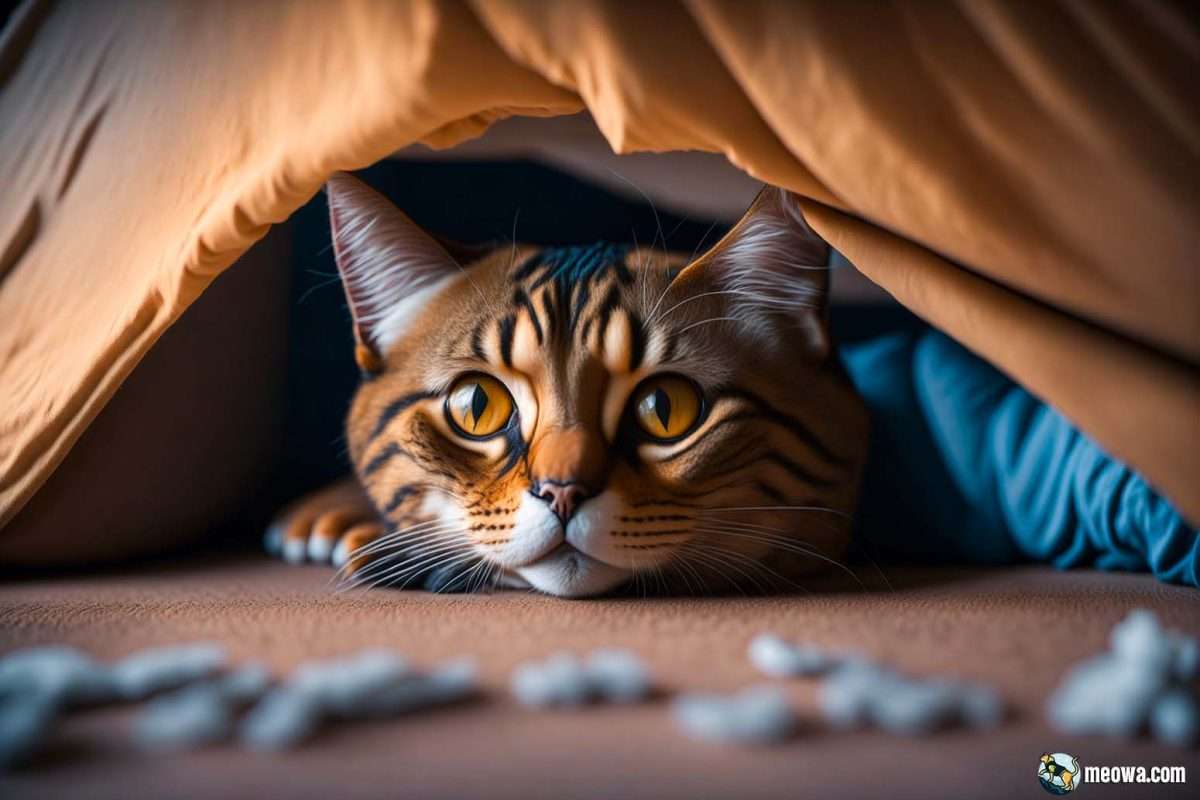Does My Cat Have Separation Anxiety: Quiz & Tips
Welcome to the “Does My Cat Have Separation Anxiety Quiz“! As a loving cat owner, it’s crucial to understand if your furry friend is feeling anxious in your absence. Our quick and engaging quiz is designed to help you uncover the truth about your cat’s emotions and well-being. Please remember, this quiz is not a substitute for a professional diagnosis. If you suspect your cat may have separation anxiety, consult your veterinarian.
So, let’s dive in and get to the bottom of your cat’s behavior!
Instructions: For each question, select the answer that best describes your cat’s behavior.
This quiz is for entertainment & informational use only, not a substitute for professional advice. Please consult a veterinarian for concerns regarding your cat’s behavior or health.
Does My Cat Have Separation Anxiety Quiz
Results:
Fascinating Facts and Statistics
- Did you know that around 13% of cats suffer from separation anxiety at some point in their lives?
- Unlike dogs, cats are often seen as independent creatures, but they can still form strong attachments to their owners.
- Studies show that indoor cats are more likely to experience separation anxiety than outdoor cats.
Why Cat Separation Anxiety Matters (and Why You Should Care)

Cat separation anxiety is no laughing matter, even though it might be tempting to imagine your feline friend throwing a kitty-sized tantrum when you’re not around. In reality, separation anxiety in cats can lead to a host of problems that can affect both their physical and emotional health. So, let’s dive into why cat separation anxiety matters and why you should care.
For starters, a cat with separation anxiety may become the kitty version of a wrecking ball, causing destruction in your home. Picture your favorite vase toppled over or your comfy couch shredded to bits. Ouch! Not only will your furniture suffer, but your poor kitty will be left feeling anxious and distressed.
Furthermore, excessive vocalization (incessant meowing and yowling) is another telltale sign of separation anxiety in cats. This constant noise can be annoying for you, but it’s downright heartbreaking to think of your fur baby calling out for you in desperation.
Lastly, unresolved cat separation anxiety can lead to health issues like over-grooming, loss of appetite, or even depression. And we all want happy, healthy kitties ruling our homes, right?
Paws-itively Helpful Tips to Deal with Separation Anxiety in Cats

If you suspect that your cat is grappling with separation anxiety, don’t fret! We’ve got some paws-itively helpful tips to ease their stress and make your home a feline-friendly paradise. So, grab a catnip toy, and let’s get started!
- Create a Kitty Kingdom: Design a cozy and secure environment for your anxious cat, complete with their favorite toys, bedding, and hiding spots. Your cat will appreciate having a fortress of solitude to retreat to when they’re feeling overwhelmed.
- Consistency is Key: Establish a consistent routine for feeding, playtime, and cuddling. Cats love predictability (almost as much as they love knocking things off shelves), so a structured schedule will help them feel more secure.
- Entertainment Galore: Keep your cat’s mind engaged and entertained while you’re away by using puzzle feeders, treat-dispensing toys, or even a bird feeder outside the window. It’ll be like cat reality TV, but without the dramatic eliminations!
- Slow and Steady Wins the Race: If your cat suffers from separation anxiety, it’s crucial to gradually increase the time you spend apart. Remember, Rome wasn’t built in a day, and your cat’s trust won’t be either!
- Don’t Hesitate to Seek Professional Help: If your cat’s separation anxiety symptoms persist or worsen, it’s a good idea to consult with a veterinarian or professional behaviorist. After all, you wouldn’t want to tackle a human-sized problem without some expert advice, right?
Expert Guidance on Pet Anxiety
During the pandemic, 23 million American households adopted a pet. Dr. Molly McAllister, Chief Medical Officer of Banfield Pet Hospital, addresses concerns about pets stressing out as owners return to work and leave their pets home alone.
Dr. McAllister shares,
“What we found across the pandemic was that for dogs and cats separation anxiety increased significantly. For dogs, it increased by about 33%. For cats, the increase was double.”
To help pets adjust to changes in routine, she recommends practicing leaving your pet for progressively longer periods and maintaining a consistent routine for them.
Some nutritional supplements and pheromones can help reduce anxiety in pets. Pheromone collars, sprays, or diffusers can provide a calming effect. Pet-friendly work policies are also becoming more common, with 50% of CEOs planning to implement such policies post-pandemic.
People Also Ask
Is my cat too clingy?
While cats are naturally affectionate, excessive clinginess could indicate separation anxiety or other issues. Observe your cat’s behavior for changes, like constantly following you, demanding attention, or vocalizing excessively. If you’re concerned, consult a veterinarian or animal behaviorist for guidance.
Do house cats get separation anxiety?
Yes, house cats can experience separation anxiety. They may display signs of distress when left alone, due to strong attachment or changes in their environment or routine. It’s essential to monitor your cat’s behavior for any indications of separation anxiety and seek help if needed.
Do cats get sad when you leave?
Cats can become attached to their owners and feel sad when you leave. They might display signs of loneliness, such as excessive meowing, loss of appetite, or lethargy. Providing mental stimulation, toys, and a comfortable environment can help alleviate their sadness while you’re away.
Why does my cat have separation anxiety?
Cat separation anxiety can result from a strong attachment to their owner, changes in environment or routine, or past traumatic experiences. Each cat’s situation is unique, so identifying the root cause is crucial in managing their anxiety and helping them feel more secure.
Separation anxiety in cats signs and symptoms
Signs of separation anxiety in cats include excessive vocalization, destructive behavior, inappropriate elimination, excessive grooming, reduced appetite, and clinginess. Keep an eye on your cat’s behavior, and if these symptoms persist, consult a veterinarian or professional behaviorist.
Can cats throw up from separation anxiety?
Yes, cats can throw up due to separation anxiety. Stress-induced vomiting can be a symptom of anxiety or other underlying health issues. If your cat is vomiting frequently, it’s essential to consult your veterinarian to determine the cause and develop an appropriate treatment plan.
How to help a cat with separation anxiety
To help a cat with separation anxiety, maintain a consistent routine, provide mental stimulation through toys and playtime, create a comfortable environment, and gradually increase the time spent away from your cat. In severe cases, consult a professional behaviorist or veterinarian for further guidance.
How to calm a cat with separation anxiety
Calming a cat with separation anxiety may involve providing a secure, comfortable space, using pheromone diffusers, offering interactive toys, and employing positive reinforcement techniques. In some cases, anti-anxiety medication might be recommended by a veterinarian.
Will a second cat help with separation anxiety?
A second cat may help alleviate separation anxiety, but it’s not guaranteed. Cats have individual personalities, and a new companion may or may not alleviate the anxiety. Carefully consider your current cat’s behavior, temperament, and needs before introducing a new feline friend.
Conclusion
Addressing cat separation anxiety is vital not only for your cat’s emotional well-being but also for nurturing their adventurous spirit. As travel and adventure cat enthusiasts, we understand that a confident and emotionally secure cat is more likely to embrace new experiences, such as outdoor activities or exploring new territories with their backpack carrier, harness, or leash. By implementing the tips and strategies discussed in this article to manage your cat’s separation anxiety, you can foster a stronger bond and create unforgettable adventures with your fearless feline explorer. Here’s to a lifetime of shared journeys and contented companionship!
In conclusion, addressing separation anxiety in cats is essential for their overall well-being. It’s also important to evaluate their happiness in general. To learn more about your cat’s contentment, take our Is My Cat Happy Quiz for additional tips and guidance on ensuring your feline companion leads a joyful and stress-free life.

